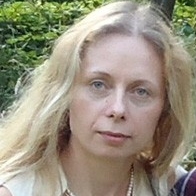
Olga Kozubska was a Fellow of the Kolleg from April 2022 to March 2023.

Olga Kozubska was a Fellow of the Kolleg from April 2022 to March 2023.
Olga Kozubska studied history at the universities of Lviv, Budapest and Leuven. In 2004, she obtained a doctorate from the Ukrainian Catholic University in Lviv and took up a position as lecturer in the Department of Classical, Byzantine and Medieval Studies. In 2007, she received a second PhD from the Central European University in Budapest with a thesis on urban development and German law in Galician Rus from the 13th to the 15th century. This was followed by research stays at the Goethe University Frankfurt am Main, the Max Planck Institute for European Legal History, the Institut für vergleichende Städtegeschichte in Münster and the Center for Religious Studies (CERES) in Bochum.
Legal Plurality and the Establishment of Urban Order under Magdeburg Law in Historical Towns of Ukraine during the Late Medieval and Early Modern Times
Religious heterogeneity of urban population was one of the most characteristic features in the historical lands of Ukraine: typically, a town was inhabited by Orthodox population (indigenous Ruthenians, but also Greeks, Wallachians and Moldavians) and Catholics (Poles, Germans, Italians, Hungarians). In addition, some towns had communities of Armenians, Jews and Muslims (mostly Tatars). The process of establishment of the urban order based on Magdeburg law demonstrated a variety of approaches: from an exclusive domination of Catholics over “the others” (as in Lemberg) to a co-existence of three Christian communities (Catholics, Orthodox and Armenians) each with its own court and a town-council (as in Kamianets of Podolia).
The aim of this project is to demonstrate how legal pluralism manifested itself in the context of urban order and in the formation of urban institutions (town court and town council) after the grant of Magdeburg law, especially taking into account the ethnically and religiously heterogeneous character of the population. Using available sources, it will be possible to see in what towns which (religious) groups were accepted to/excluded from urban rights, who could be elected to the town council/town court and how, in general, religious diversity influenced the unification/pluralization of urban law. The geographical scope of this research is limited to three historical lands of present-day Ukraine: Galicia, Wolynia and Podolia.
Kozubska, Olga, Das Magdeburger Recht in den historischen Ländern der heutigen Ukraine. Historiografie – Rezeption – Nachleben, in: Gabriele Köster/Christina Link (Hg.), Faszination Stadt. Die Urbanisierung Europas im Mittelalter und das Magdeburger Recht (Magdeburger Museumsschriften 1), Magdeburg 2019, 732-746.
Kozubska, Olga, Becoming a Citizen. Formation of Communities and Urban Liberties in former Kievan Rus’ Principalities, in: Michel Pauly/Franz Irsigler (Hg.), Urban liberties and citizenship from the Middle Ages up to now, Trier 2011, 69-100.
Kozubska, Olga, ‘propter disparitatem linguae et religionis pares non esse’. ‘Minority’ Communities in Medieval and Early Modern Lviv, in: Derek Keene/Katalin Szende (Hg.), Segregation – Integration – Assimilation. Religious and Ethnic Groups in Central and Eastern Europe (Historical Urban Studies XXX), London 2009, 51-67.
Kozubska, Olga, German Law in Medieval Galician Rus’ [Rotreussen], in: Rechtsgeschichte (Rg) 13 (2008), 25-46.
DOI: http://dx.doi.org/10.12946/rg13/025-046
Kozubska, Olga, Ius Theutonicum Magdeburgense in Ruthenian Privileges in the Fourteenth and the Fifteenth Century, in: Proceedings of the International Conference “European Cities of Magdeburg Law: Tradition, Heritage, Identity”, Krakau 2007.